Stathaki, M. (2025). The Unit’s Work «From Yesterday to Today» [JD]. Systemic Thinking & Psychotherapy, 26, 39–47. https://doi.org/10.82070/syst20252609
This paper is based on a lecture given at a conference held in October 2024 to celebrate the 30 years of operation of the Family Therapy Unit of the Attica Psychiatric Hospital, and a farewell to the founders of the Unit.
------------------------------------------------------------------
The presentation begins with a brief historical review of 30 years of the Unit’s operation, a history that is absolutely interwoven with the course of its founders, and then concludes with the work of the Unit through the recording of statistical data, which was drawn from the Unit’s archive.
History
The vision of the founders of the Unit began to be realized in September 1994, when it officially began its operation, as a special outpatient unit of the Attica Psychiatric Hospital. The Family Therapy Unit is the first unit, within the Public Health Care Service, that is NOT sectorised and does not have a specified area of responsibility. The Unit, from its establishment until today, is housed at 3 Ellanikou Street, in Pagrati. The staff initially consisted of the founders of the Unit, psychiatrists, Mrs. Charalabaki and Mr. Kotsidas, as scientific supervisors, and Mrs. Goka, a nurse, who covered the administrative and secretarial needs of the Unit, as well as volunteer members from its training groups. At the time of its establishment, the objectives of the Unit were set, which were to provide therapeutic, educational and scientific work.
Its therapeutic work is to provide care, primarily to families of inpatients of the Attica Psychiatric Hospital, in order to improve their intrafamily relationships and avoid any relapse, and then to treat families from the community, contributing in this way to the prevention, treatment or rehabilitation of mental disorders. The Unit, from its inception until today, provides individual therapy, group therapy, systemic therapy, couples therapy, family therapy, and counselling. Individuals and families who are motivated and willing to engage in psychotherapy contact the Unit themselves. The initial contact is made over the phone (intake), where they report the problem and their request. The staff of the Unit, today, consists of 2 Psychiatrists, 1 Psychologist, 2 Social Workers, 2 Nurses, and 1 Administrative employee.
Regarding its training work, an integral part of the Unit is the conduct of a training program entitled "Systemic Psychotherapy". The Unit has been recognized since 2001 as a Special Training Centre by the European Family Therapy Association (EFTA-TIC) and follows the training standards set by EFTA. Also, the Unit in the context of its educational work, supports the practical training of Psychology students and postgraduate students, as well as nurses as part of the training on the Mental Health specialty.
Its training program is addressed to mental health professionals in both the public and private sectors and is free of charge. The first training program started in 1994, with a duration of 3 years, and a total of around 150 teaching hours. The number of participants was 15 people, as many as the applications. The supervision team began in 2001, (and had a span of 1-2 years with a total of 50 hours per year). The program continues to this day. Its duration is 4 years, and requires the completion of 600 course hours (with supervision having been integrated in the basic training program), following the specifications set by EFTA-TIC. In 2023, the 27th group began its training with 21 participants out of a total of 284 applications. (Table. 1.)
Table 1. Systemic Psychotherapy Training Program

The total number of trainees for all years is 547. In Figure 1, the total number of Attica Psychiatric Hospital employees who were trained in the Unit is presented. This consisted of 124 people. Of these, 70 are psychiatrists, 22 are psychologists and 32 are social workers, nurses and other specialties.
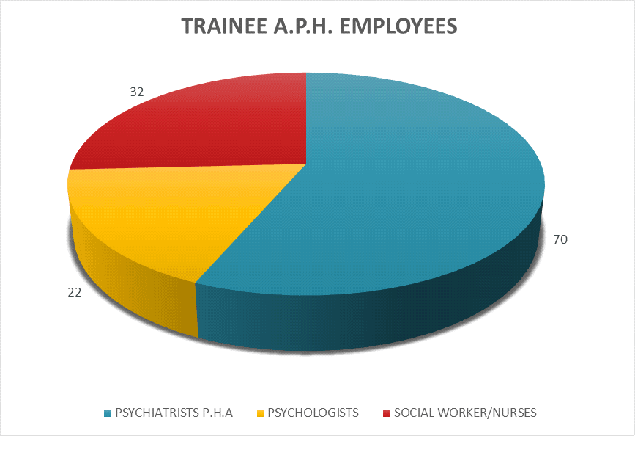 Figure 1. Trainee A.P.H. Employees
Figure 1. Trainee A.P.H. Employees
In the following Figure (Figure 2), the total number of psychology and postgraduate students is presented. That was 120 students. Of these, 81 were from the National and Kapodistrian University of Athens, 33 from Panteion University and 4 are postgraduate students.
Figure 2. Trainee Psychology Students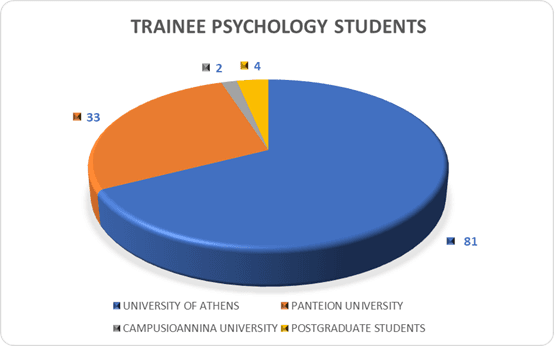
As part of its scientific work, the Unit has organized 14 conferences and workshops since 1994. The 1st conference was organized in 1995, with the title "Family Therapy Today" and Mony Elkaim as the official guest speaker. The 14th conference was held in the same place, to celebrate its 30 years of operation. In addition to the workshops, members of the Unit have translated and edited the publication of M. Bowen's classic work, "Triangles in Family Dynamics". Watzlawick's book "The Theory of Human Communication" was also published, edited by Mrs. Charalabaki. This was followed by the publication of the book "Memories and Reflections", the content of which was the material of the conference organized in 2017 entitled "20+3 years: What remains, what has changed" and was recently republished. Finally, members of the Unit are on the editorial board of the journal "Metalogos" and the electronic journal of HE.S.T.A.F.T.A.
Statistical Data
The numerical depiction of the work of the Unit, through statistical data, is drawn from the daily recording of therapeutic sessions, and the recording of telephone referrals (intake), (Table 2).
Table 2. Recording of statistical data
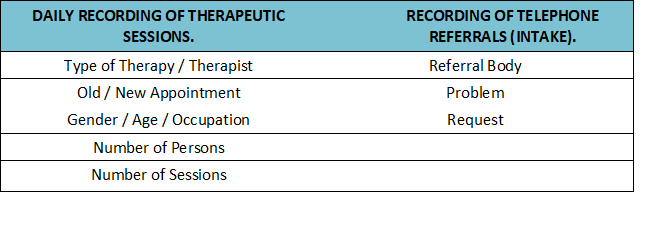
Based on these records, in Figure 3 presents all sessions held in the Unit, from its inception until today, grouped by decade. In the 1st decade (1994-2003) 2,801 sessions were conducted, in the 2nd decade (2004-2013), 15,120 and in the decade 2014-2023, 17,221. These make up a total of 35.142 sessions.
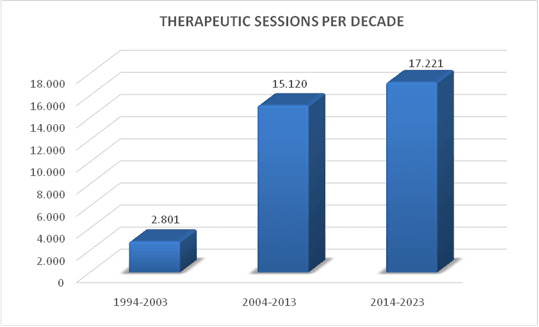 Figure 3. Therapeutic sessions per Decade
Figure 3. Therapeutic sessions per Decade
Regarding the total number of telephone referrals from its inception until today, 6,493 referrals have been recorded, of which 4,690 came to the Unit for a session, while 1,803 either cancelled/did not attend, or were referred to another institution. (Figure 4.)
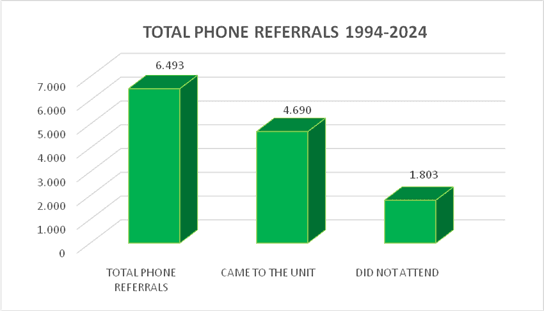 Figure 4. Total Phone Referrals 1994-2024
Figure 4. Total Phone Referrals 1994-2024
More specifically, in Figure 5, Comparative data is presented regarding the total number of therapeutic sessions held between 2023-2024. In 2023, 1,283 sessions were held, 551 of which were individual, and 732 were for families and couples. In 2024 (up until July), 930 sessions were held, of which, 367 were individual and 563 for family or couples. The total number of people who came for treatment in 2023 was 2.238 and for 2024, 1.696.
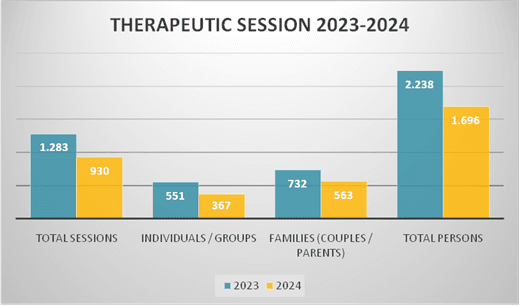 Figure 5. Therapeutic Sessions 2023- 2024
Figure 5. Therapeutic Sessions 2023- 2024
The total number of new telephone referrals, i.e. those that contacted the Unit for the first time, in 2023 was 149. Respectively for the year 2024, (up until July) the number was 147. In Figure 6, The types of treatment performed are presented, in which it appears that family therapy had the greatest frequency.
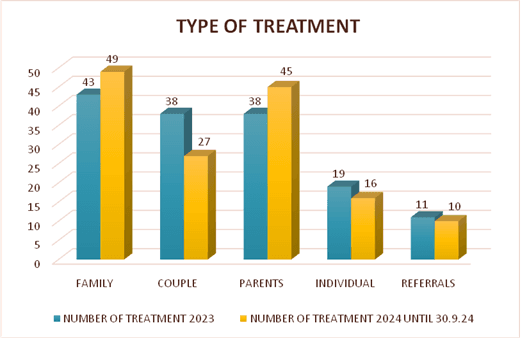 Figure 6. Type of treatment 2023-2024
Figure 6. Type of treatment 2023-2024
Regarding the origin of referrals, there is an increase in referrals from public bodies and mainly from the Interdisciplinary Assessment Counselling and Support Centres (KEDASY), and the Juvenile Prosecutor's Office, as presented in Figure 7.
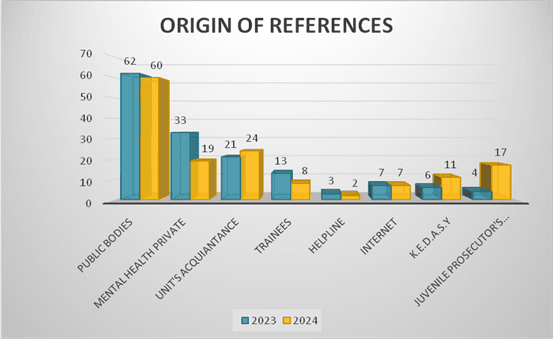 Figure 7. Origin of References
Figure 7. Origin of References
Finally, Figure 8 presents the problem mentioned during the initial telephone communication. The majority of these fall under the category of intrafamily relationships. These are families, couples or parents who face difficulties at some stage of their life. What might be interesting to note is the upward trend observed in the category of conflictual relations. It seems that couples and families are dominated by intense aggression and a confrontational environment. Also, it is important to mention the change observed in the symptoms that children now present, compared to the past. In addition to psychiatric and eating disorders, many cases of self-harm are reported and, in some cases, refusal to go to school, aggression and gender dysphoria are also reported. Another finding concerns the increase in diagnoses in children with learning disabilities, which leads parents to seek professionals for psychoeducation and counselling.
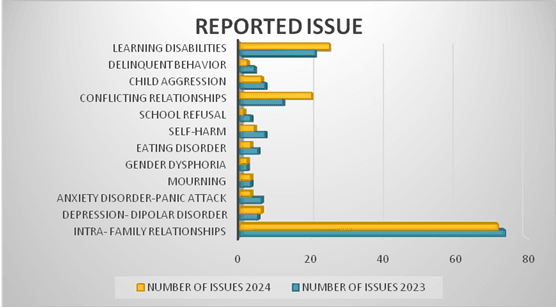 Figure 8. Reported Issue
Figure 8. Reported Issue
The final part of the statistic findings refers to a new category of referrals coming from the juvenile prosecutor's office, requesting the provision of family therapy to families in litigation with repeated lawsuits, after divorce or in the process of obtaining one. Their relationships are confrontational and characterized by rivalry, vindictive behaviour and inability to fulfil their parental roles.
When processing the statistical data on the prosecutor’s referrals, it was found that the 1st such referral was recorded in 2014; the same frequency remained until 2021. For the years 2022-2023 there was an increasing trend, with 4 referrals, while in 2024 (up until July) there was a significant increase with 17 referrals (Figure 9.).
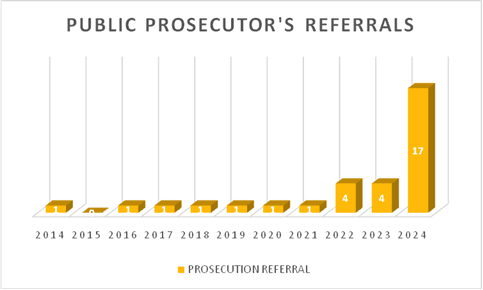 Figure 9. Public Prosecutor's Referrals
Figure 9. Public Prosecutor's Referrals
In terms of sessions held, in 2017 one family concluded therapy with 15 sessions. In 2022 and 2023 there were 30 and 25 sessions respectively, while in 24 there were only 5 sessions. (Figure 10.)
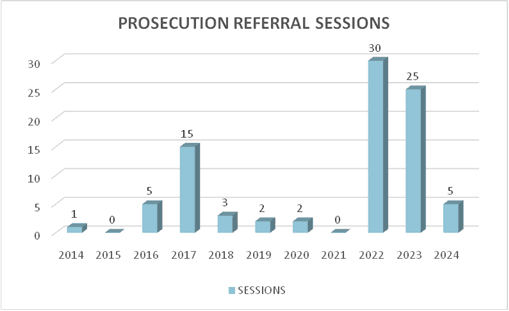 Figure 10. Prosecution Referral Sessions
Figure 10. Prosecution Referral Sessions
Comparing Figures 9 and 10, we observe that in 2022 and 2023, 4 referrals were made for each year, and 30 and 25 sessions were held respectively. In 2024, although referrals increased, to a total of 17, only 5 of the families came, and held a total of only 5 sessions. Of the remaining 12 referrals, some made an initial telephone contact with the Unit but never came, some did not make any contact at all, and finally, in some cases, only one side contacted the Unit, stating that there is no communication with the other party.
If we wanted to describe the profile of these families, we would say that:
· The request for a therapeutic intervention comes from the public prosecutor's office or the relevant social service and not voluntarily from themselves.
· Their motivation is to obtain formal documents (certificate of attendance of sessions) for judicial use, to perpetuate the litigation and not to fulfil their parental role.
· The utilisation of various services, such as the police, the prosecutor's office, social services, mental health institutions, etc.
· Involvement of lawyers in the therapeutic process. For example, in a request by the public prosecutor's office for family therapy, the first contact with the unit is attempted by the lawyer and not by the person directly concerned.
Therefore, to summarize the changes observed in the Unit over the years, from yesterday to today, it is evident that despite the main request of families remaining the same, namely the improvement of intrafamily relationships, the dynamics of their problems seem to be changing; they are more intricate, complex and in some cases at a deadlock. What emerges (based on the statistics of the Unit) is that within families there is a strong conflictual environment, and increased aggression, which brings alienation and hostility to the family system; The question arises whether this escalating aggression could be related to the observed increase in prosecutor’s office referrals. Many families are referred to the Unit by the Public Prosecutor's Office for family therapy due to intense disputes, court battles and repeated lawsuits, which do not allow them to fulfil their parental role, resulting in painful consequences on their children’s psyche.
These dysfunctional relationships within the family system may also be related to the change in symptoms that children now display. In addition to psychiatric and eating disorders, there is an increase in self-harm, aggression, refusal to attend school and gender dysphoria.
The role of family therapy in these dysfunctional families is to create a psychic space, where this aggression can be turned into speech, which will allow each family to adopt new ways of communicating and co-constructing the new reality of the family’s story.
In closing, we would say that this anniversary conference was a historical reminder of the work of the Unit. For every family, its history is important to understand ‘today through yesterday’. Likewise, for the ‘family’ of the Unit it is important, through such an anniversary meeting, to discuss its history - where it started from and in which stage of its life cycle it is today. Perhaps the Unit is experiencing its own ‘leaving home’, but in its case, the parents (founders) are leaving the home (Unit) and the other members are now called upon to renegotiate new roles and ways of relating to their ‘family’ system, while maintaining the core values and vision of its founders; the ‘sincere care’, the acceptance of difference and the welcoming of the innovative, hoping that it remains a collective effort of co-creation and co-evolution.
So, being part of a story means personal involvement, but also commitment to its continuity.


